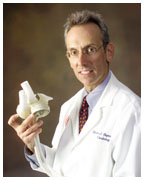|
Web Exclusives: Alumni Spotlight December 8, 2004:
Marvin Slepian ’77 helps invent completely artificial device to pump blood The 8,000 patients who are waiting for a heart transplant at any given time soon may have new hope. Marvin Slepian ’77, a cardiologist at the University of Arizona, has been directing the development of a completely artificial heart — made of plastic and titanium — to replace the pump and valve functions of a human heart and allow patients to survive for up to three years while they wait for a heart to become available. About 30 percent of patients die while waiting to receive a heart transplant. The Food and Drug Administration approved the new heart in October. Leading cardiology centers will start training doctors to implant the devices next year, says Slepian, the founder and CEO of SynCardia Systems, a developer of biomechanical cardiac devices. “When a patient has irreversible biventricular failure, that patient is in imminent danger of dying. The total artificial heart will provide complete circulatory replacement,” Slepian says. A self-described “crazy science kid,” Slepian has been inventing things since his youth when he made projects for science fairs. A biochemical sciences major at Princeton, he had planned on specializing in oncology or infectious diseases. But during his medical residency he was drawn to cardiology, which seemed to be a field in which he could successfully solve medical problems. In cardiology, “you could actually fix something and make it better,” says Slepian, who holds almost 60 patents. The artificial heart, implanted in the chest, will be hooked up to a pump the size of a washing machine, by way of a pair of tubes that will stick out from the patient’s lower chest. The pump, plugged into a wall socket, will push pressurized air into the heart, causing it to expand and contract like a human heart would. The next step for Slepian is developing a smaller pump that would
run on batteries, so that patients could move about and live at
home. Slepian believes the artificial heart could one day be used
as a permanent device instead of simply an interim measure. “We
get excited in medicine about a chemotherapy drug that buys you
six months of life. With the artificial heart we have a device that
could buy you three to five years,” he says. By Anne Ruderman ’01 Anne Ruderman ’01 is a journalist in Concord, N.H.
|
||

